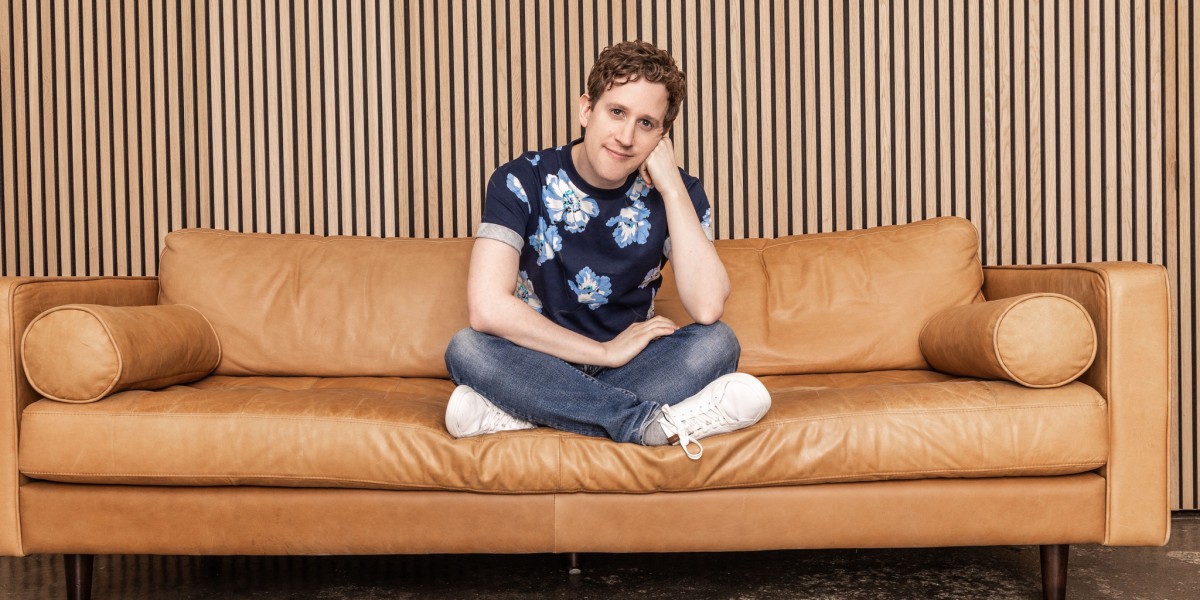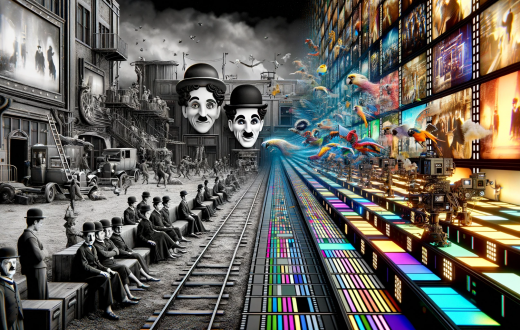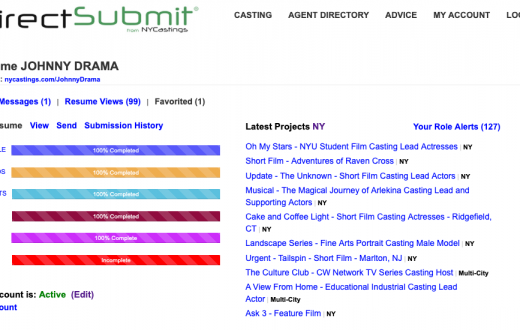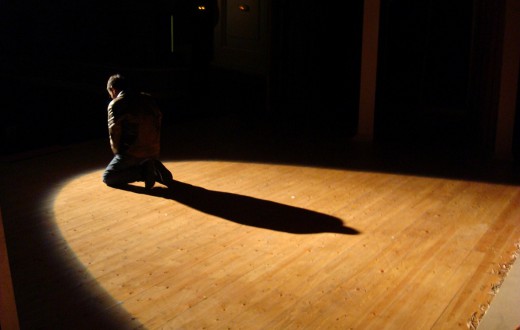Alex Wyse is a multi-talented Broadway actor, writer, director and producer known for his relentless work ethic and creative drive. With a diverse skill set and a passion for storytelling, he’s a true go-getter who always gives his all to every project he takes on. With numerous passion projects in the works, Alex Wyse is an artist to watch now and in the coming future. Please enjoy our exclusive interview!
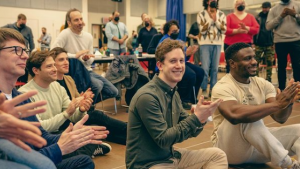
Your latest Broadway show, Good Night, Oscar, just opened at the Belasco Theatre. You play Max Weinbaum, a new Tonight Show intern and well-meaning fan of all things showbiz, who tends to Oscar (played by Sean Hayes) during his appearance. Tell us about your audition.
My first audition was a self-tape that I got from my agent. Then I had three callbacks. That first callback was my first in-person audition since before the pandemic. I was scared out of my mind, but I worked very hard to stay sane and foster my belief in myself. The whole process lasted about two months before I got the job.
Do you have your own dressing room or is it shared? Are there speakers in your dressing room so you can hear the show so you know when to come on, or do you stay backstage / near the stage throughout the whole play?
I have my own dressing room- my first time having my own Broadway dressing room! There are speakers, as is customary for nearly all backstage spaces. Otherwise, it’s just too risky. Once the show starts, I only go back to my room once in the middle of the play for a five-minute break. Otherwise, I stay on deck since I have lots of sporadic, quick entrances.
You’ve also been on Broadway in Spring Awakening, Waitress and Lysistrata Jones. For Good Night, Oscar, what is the rehearsal schedule? Do rehearsals from show to show differ in the way that they’re structured?
Rehearsal schedules are always a little different depending on the show. For Good Night, Oscar, we did a “straight-six,” meaning six hours with a twenty-minute break in the middle for lunch. Other shows might do a full eight-hour day with a one-hour break in the middle. But we kept it shorter, which was great, since that meant we got to sleep in later. I got the part in November; it was one of the happiest and most emotional phone calls of my life. I think I fell to the floor and screamed/sobbed, and we started rehearsals in March. I didn’t know my lines on the first day, but that was okay. Usually it’s not required that anyone does. I could have worked to study them before had I wanted to, but I decided to just familiarize myself and then actually learn them in the process while I was developing the character. That way I’d remain more malleable during rehearsals instead of becoming set in my ways. Rehearsals were held at New 42, and we were only called if we were in the scene being rehearsed. That being said, it was usually the full cast (just seven of us) present.
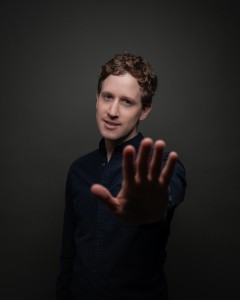
What’s in like coming out the stage door after a show and being bombarded by fans? Any crazy stories?
I get a little socially anxious, so it’s not easy for me to be in a crowd, but I always feel thankful that anyone notices what I do. So, I just remain thankful that there’s anyone at the stage door barricade… ever. In terms of crazy stories, there have been times in the past when people have said rude things to me, along the lines of, “You sounded good this time,” but I can laugh about that. For the most part, fans are passionate and respectful people, and I wouldn’t be doing what I’m doing if I wasn’t a fan myself. That’s a big part of what I can tap into in playing Max: the absolute wonder he feels at getting to hang out with his idol. Opposite Sean Hayes, it’s not a challenging quality to tap into.
Broadway has gone through many changes over the years. What trends do you see in the industry today, and where do you see Broadway headed in the future?
I am glad to see more diverse stories and creative teams on Broadway. It’s certainly better now than it was five years ago, even if there is still a way to go. I also hope we can create a better financial model so more diverse (and young) audiences are able to actually see these stories being presented. I don’t know how we can overcome capitalism, though. Also, I hope we see more original scores on Broadway. We don’t have enough!
You’re also a Writer, Director and Producer, having recently released a film called Summoning Sylvia, which you co-wrote and co-directed alongside your writing partner Wesley Taylor. How did you come up with the storyline for Summoning Sylvia? What did you do to make it more unique than other horror movies?
Wesley and I wanted to tell a story about a group of queer friends and create a suspenseful film around them where they weren’t killed off. That was task number one. Part of what we did was allow ourselves to write toward the conventions of horror movies but use the characters’ “otherness” and their specific friendship dynamics to let the plot go in unexpected directions. So, we both embraced the tropes and worked to advance the tropes within the genre.
This is not the first time you’ve worked with Wesley Taylor, having previously bonded over the Emmy nominated series Indoor Boys. How did you and Wesley meet? What was your first collaboration meeting like?
We knew each other through the theatre scene. But we really became close while living in Los Angeles. That’s when we started hanging a lot, then decided to make a web short together. Eventually that became Indoor Boys. I don’t know that our collaboration meetings ever felt that much different than us hanging out as friends. I think that’s what makes it work so well- it comes from a place of being great pals spending time together, and then we let that dynamic morph into the flow of ideas.
How do you get the funds to develop your passion projects?
At first, we used the money we were making as actors to fund the projects. As the projects became bigger, we started pitching the project to producers, co-producers, and investors, the same way anyone in theatre would raise funds for their shows. We create pitch documents, we work very hard to build responsible financial models, we knock on every single door until someone says yes. We’ve been lucky that some people have, including our brilliant lead producer Cody Lassen, who moved mountains to get our film to the finish line.
My guess is that you’ll continue making passion projects. What’s in store for your future regarding writing, directing and producing? Anything new in the pipeline?
Wes and I currently have three projects that are finished and waiting to be made. We meet up several times a week to work on developing new things. We are hoping to have a long career of making things together. So stay tuned!
Besides theater, you’ve also been on television series such as The Marvelous Ms. Maisel, Masters of Sex and NCIS: LA. What’s the difference between working on stage vs. working on a movie or TV set?
I love both mediums for different reasons. I will say, a negative I’ve experienced coming from a theatrical background is that working on television can sometimes feel impersonal. You don’t get to know people in the same way and the departments can feel a bit more disconnected, especially from the standpoint of an actor only present for a day or a handful of days. Also, TV can feel like you’re stepping into someone else’s house whereas in the theatre, it feels like we’re building the house together. But I love the challenge of scaling my performance differently for each medium. How do I keep it intimate for the camera and merely think the thoughts, how do I scale it up for the theatre so the last row gets the story? But I like it most when these mediums feel the same. Finding ways in which TV can be theatrical, finding ways in which the theatre can be cinematic. The only real difference is that one has a camera, and one has an audience. All the other differences are essentially made-up. Maybe that’s advice I need to take…working on freeing myself from feeling like there is such a huge difference.
You grew up in Cleveland, Ohio and received a Bachelor of Fine Arts from Boston University’s College of Fine Arts. What made you want to go to Boston University? What was the most valuable lesson you learned at college?
I chose Boston University because of their Theatre Arts program. In it, I was able to take the acting classes I wanted while also curating a well-rounded theatre education, studying things like playwriting, theatre ensemble, and design. But the most valuable lessons I learned were probably when I felt rejected by my school, didn’t get good casting, and got negative critiques from the teachers. That’s when I pulled myself up by my bootstraps, stopped relying on other people to choose me, and made my own projects.
How do you prepare for a role both physically and emotionally, and what techniques do you use to get into character?
Getting into character, for me, consists of taking a breath and quickly reminding myself of the given circumstances for the scene about thirty seconds before I enter. Outside of that, I’m not into a lot of prep. I’m into hanging out with people and fostering a sense of “play” for myself and the folks around me.
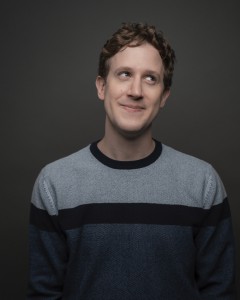
Acting is a scary career financially. How do you make sure you can pay your rent?
I’ve been lucky that I’ve made my living as an actor. To sustain it day-to-day, I eat a lot of cheap meals and make sure that I’m saving as much money as I can. Getting a significant paycheck has come infrequently, so I stretch my dollars, I invest the money I have, and I’ve gotten this far.
What advice would you give to aspiring actors who are just starting out, and what do you wish you had known when you were first starting your career?
I wish I hadn’t spent so much time trying to morph myself into what I thought everyone else wanted me to be. As I’ve gotten older, I’ve been better about saying, “No this is who I am, this is what I do.” If I lean into the things that make me into me, then the right projects come my way. But if I spread myself thin becoming someone else’s version of me, then I lose the qualities that make me special. Be yourself unabashedly, and that’s your power.
Anything else you’d like to say?
Come see Good Night, Oscar on Broadway, rent Summoning Sylvia on demand everywhere, check out the cast album of A Commercial Jingle for Regina Comet which is currently streaming, watch Indoor Boys on Here TV, and call your mother.

